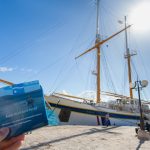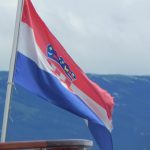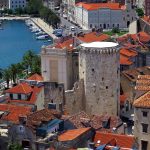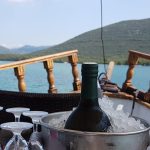The entire Island of Krk recycles 50 percent of its waste, with that number rising to 60 percent last December. To compare, the Croatian average is 15 percent, while Zagreb is at 1 percent
Reverend Nikola Radić just returned to his native Kremenići near Malinska town on Krk island from Omišalj, using his electric car, the first of its kind on Krk. As soon as he parked it, he plugged it in for recharging. He explains the cost is negligible, considering one charge is sufficient for 100 kilometres and costs around 10 kuna, with power gained from his own solar system, also the first on Krk. He also displayed his electric bicycle, which he doesn’t ride as much anymore due to his age (81), Deutsche Welle reported on May 6, 2017.
Besides using energy from renewable sources, his household is also self-sustainable. In his garden, reverend Radić grows two dozen types of vegetables, watered from his own rainwater tank, while his 16 olive trees provide enough oil for the entire year. He also has four chickens. He had more, but when he saw he did not need them, he gave them away. Almost all of his waste – except plastic – is recycled.
Radić gladly shared his experience with Deutsche Welle of “living with the sun,” as he said. A dozen years ago, as he retired, he had around 100 thousand kuna saved. “I did not need that money, and as a Christian and Catholic I kept to the principle that money which I do not need is not my money. I used it to show an example of how such a system is possible. I wanted to break the ice,” said Radić and added that ecological problems should not only be viewed through the prism of money and affordability, but also sustainability and benefit for the community.
Although retired for three years now, Radić still wants to help people and change their way of thinking, deeply convinced that such a method of producing energy is the most ecologically acceptable and prudent in today’s times. “When people come by to look at my solar system, they ask me when will I break even? And I answer: I already have, as it made you come by!”
And it seems he is more than successful at that. His example was followed soon by others on the island. The vehicle inspection station and GP Krk, the largest construction company on the island, erected solar power plants on the roofs of their buildings. Before they did so, they all came to Kremenići to see how it works. Reverend Radić’s mission was thus fulfilled.
Krk is today the Croatian leader in terms of renewable energy, as well as in separation and disposal of waste. The entire island separates up to 50 percent of waste, with that number rising to 60 percent last December, meaning from every tonne of waste, 600 kilograms are recycled and reused. To compare, the Croatian average is 15 percent, while Zagreb is at 1 percent, making it one of the worst capital cities in that category.
“Krk has already entered 2020 by the amount of recycled waste, as 50 percent of recycled waste is the European Union goal for that year. Our goal is to separate 80 percent of waste by 2020 and by 2030 achieve complete energy independence of the island, making Krk the first energy independent island in this part of the world,” explained Vjeran Piršić, veteran ecology activist and founder of the ecological association Eco Kvarner, residing in Njivice on Krk Island and one of the best to talk to about the Krk ecology miracle.
The example of Krk is interesting to Korčula, Lastovo, Mljet and Pag, while Piršić demystifies the entire story. “We did not discover hot water. The sustainability model is the way islands always used to function,” Piršić prompted us.








